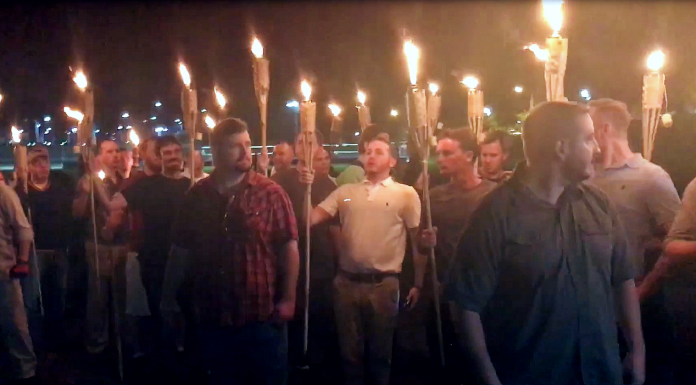(Ken Silva, Headline USA) Another demonstrator from the infamous 2017 torch march in Charlottesville, Virginia, has been charged with a little-used law that makes it a crime to burn objects with intent to intimidate—the latest indictment over the six-year-old incident by the city’s recently elected, George Soros-backed district attorney.
The defendant, Augustus Sol Invictus (who was born Austin Mitchell Gillespie), was allegedly the author of the “official manifesto” of the 2017 Unite the Right rally. According to the Franklin News–Post, Invictus was granted bail at his court hearing on Wednesday.
Invictus is the latest torch-marcher to be charged by Charlottesville D.A Jim Hingeley, who made it a campaign promise to prosecute torch-carriers. His predecessor, Robert Tracci, had declined to press charges.
Participants on white nationalist blogs and message forums are expecting mass arrests in a Jan. 6-like prosecutorial crackdown.
“A Soros-backed prosecutor has fulfilled his campaign promise by bringing meritless charges against attendees of a 6-year-old political demonstration, which was coordinated with law enforcement,” wrote white nationalist Christopher Cantwell in April.
“Since then, a few names have been released, and we can expect more to follow,” Cantwell added. “There is a distinct possibility I may be one of them.”
The torch marchers have expressed pessimism about being arrested, but optimism about ultimately being acquitted.
The charges should ultimately be defeated in court because “there was zero intent via the organizers or the rank and file to seek out or confront any specific group or individual,” someone wrote on the blog Full Haus, which markets itself as “the world’s finest show for white fathers.”
The contrary to misinformation pushed by leftists including President Joe Biden—who has frequently claimed that demonstrators emerged from “out of the fields” (with the only nearby fields being those of the athletic variety)—the rally took place in a public space that has often been celebrated for its association with free speech, the University of Virginia’s Rotunda.
“Holding a tiki-torch burning, self-contained citronella fuel while walking on public property regardless of slogans is not remotely in the same category as burning a large wooden cross in front of your black neighbor’s house,” the blog said, referring to the slogans such as “you will not replace us” and “blood and soil.”
The state-funded university, founded by Thomas Jefferson but now run by leftist idealogues, has since amended its rules to restrict such gatherings. However, it had no specific policy in place that would have prohibited the torch rally at the time.
“Due process and First Amendment issues will jump off the page of any lawyer who agrees to fight this,” said the blog.
Invictus’s lawyer reportedly agreed.
“We’re not trying the case today,” defense attorney Terrell N. Roberts III reportedly said. “But what I see is protected First Amendment activity.”
Invictus’s trial is set for March 2024.
The Charlottesville rally turned deadly the day after the torch march, when a 20-year-old Ohio man rammed his vehicle into a group of counterprotesters and killed a local activist. The driver, James Alex Fields Jr., was convicted of murder and given life imprisonment.
The law being used to pursue the peaceful protestors from the night before was enacted by the state in 2002 in response to Ku Klux Klan cross-burnings.
It was challenged all the way to the Supreme Court, which ultimately found the law constitutional in a 6-3 vote.
Individuals convicted under the law face one to five years imprisonment.
Ken Silva is a staff writer at Headline USA. Follow him at twitter.com/jd_cashless.

